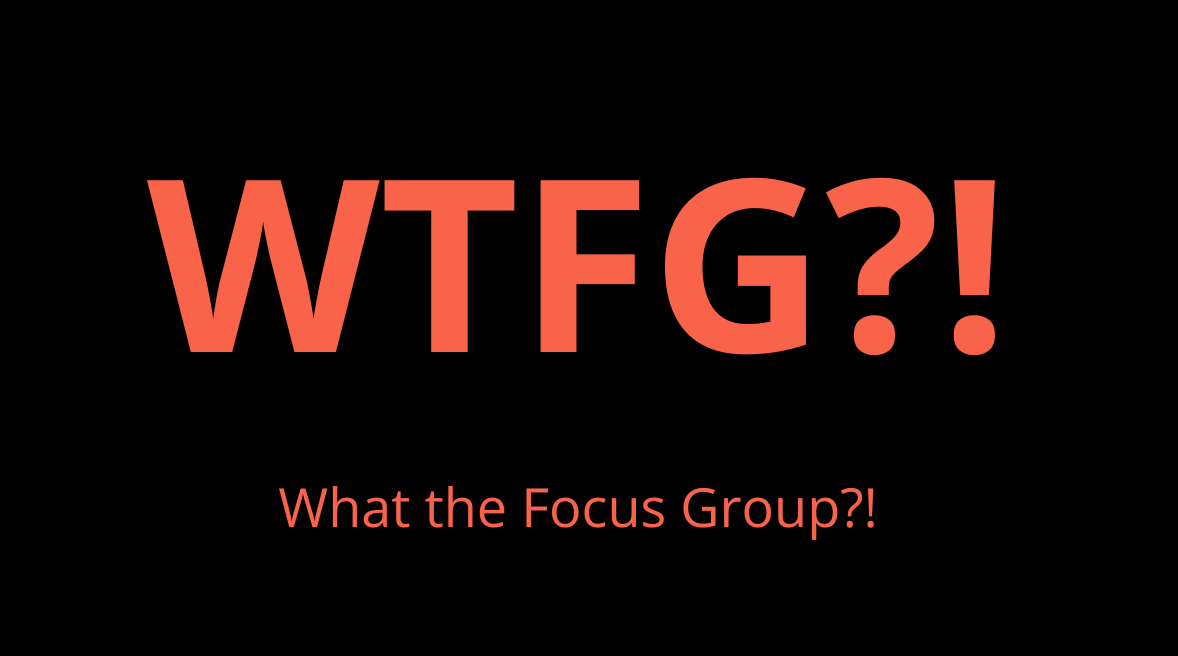WTFG?! What the Focus Group?!
The expression or feeling immediately following a focus group that was eye-opening, in either a good or bad way.
First, testing witness credibility is an excellent use of focus group time. All lawyers worry about how their clients, witnesses, and experts will come across to the jury. Judging a witness is the easiest task a juror can do because we do it daily as humans. Lawyers also know that depositions are roughly fifty percent (50%) credibility and a negative report back to decision-makers can unnecessarily add time to a case. For example, if a client comes across as confusing or too wordy this can generate a negative credibility report, which then gives the insurance adjuster reasons to delay new settlement offers that could possibly complete the lawsuit.
Naturally, the lens we use to judge witnesses is different than a non-lawyer. We, lawyers, are anesthetized to deposition testimony because we see and participate in it regularly. Therefore, we tend to be overly critical and hyper analyze the deposition testimony & presentation.
SIDE BAR: I would be amiss if I didn’t take a moment to plug proper witness preparation. Witness preparation is not a list of instructions handed over or communicated in one (1) 30-minute meeting. Instructions have no meaning without context and are quickly lost in a witness’s brain in the heat of deposition questioning. Take time to teach your witness, listen to their concerns, and give ample time for the preparation process. People learn at different speeds but at a minimum having two separate meetings will significantly increase deposition “success.”
Witness video deposition clips are also where a focus group can help assess how well the lawyer performed in the deposition. Definitely, where I see/hear WTFG?! reactions because the participants will harshly judge the lawyer behavior. For example, a clip may be created to frame a witness in a negative light (i.e. won’t answer the question) but the focus group only talks about the badgering lawyer. I have also seen lawyers use additional questions with the focus group participants to evaluate whether they’ve proved elements of a claim.
Witness Credibility Focus Group Set-Up:
Take 5-7 minutes (10 min max) of deposition video and play it for a focus group to get credibility assessment and overall blink reactions to witness.
Yes, you can mix and match parts of the deposition. But be wary of picking only the favorable clips, or clips that are mostly all the lawyer talking compared to the witness. I suggest finding open-ended questions and playing those to the focus group.
What if you didn’t take video of your client? Use Zoom or another platform to create a short video using open-ended questions or questions from their deposition.
What are we looking for? Snap judgements of the witness, and where those judgments are coming from. Focus groups can even tell you strengths/weaknesses and how the witness could improve.
What do we do with the snap judgments? Lawyers can develop strategies to maximize the witness credibility or seek out additional witnesses to help provide context information about the client/witness.
WTFG?! Witness Credibility Example 1:
Recently, we did witness credibility focus group for a medical malpractice case. The facts involved a stroke patient in an emergency room. The deposition clips of the defendant neurologist and defendant nurse were played. The focus group had been told factual context before watching clips.
Here are some of the snap judgments on the neurologist:
“Nonchalant and cold”
“He’s calm cool and collected not moody”
“knowledgeable and prompt in answering”
“Unreliable dishonest”
“A little evasive and imprecise”
The nurse was a 2 out of 10 on credibility scale and here are some of their words:
“trustworthy honest”
“UNCARING”
“Slacker, doesn’t care”
“Not responsible”
“Confused nervous”
The lawyers were ecstatic to hear the comments and ratings for both witnesses. The focus group continued in discussion to talk about both witnesses and the case as a whole. Based on the snap reaction to the clips, they went back to the deposition transcripts and began to draw up their cross examination for trial.
WTFG?! Witness Credibility Example 2:
The case involved several plaintiffs suing a larger education entity for discrimination. The depositions of the plaintiffs were coming up. The lawyer wanted to get feedback on the case and witness credibility before depositions in order to assist with client preparation. We set up Zoom interviews with each plaintiff and recorded them for focus group purposes. The questions were simple and open-ended including “Who are you suing and Why?”. Witnesses were not coached or instructed beforehand. We played the videos and had participants answer questions in the Chat before any discussion.
The snap judgments:
Daniel: “Why did she give barely any details on the specific situations?”
Elizabeth: “I would also like to have more details about why she felt that the discrimination she went through was due to gender.”
Matty: “how come you did not know about others similar cases while in campus?”
Dale: “Why did you proceed with the job application process if you had hesitancies upon interviewing?”
Victoria: “why wasn’t she more specific on why she’s suing them?”
The discussion revealed more toxic comments from the participants, but also we received suggestions and ways to improve. In the debrief meeting immediately following the focus group, the lawyers and I drew up a plan of action for preparation. Additionally, we laid out a strategy for revealing the focus group comments without doing any emotional damage to the clients.
The outcome: the clients were about to communicate clearly their claims and support without rambling or going off topic. The clients felt better about their depositions (as compared to the Zoom interviews) and the lawyers knew they’d placed the case on stronger footing.
Here’s the simple truth: Running a witness credibility focus group will result in WTFG?! moments because judging other humans is built into our DNA.
A witness credibility focus group is one of the simplest set-ups and interpreting the feedback is straightforward. It can be done in 1 hour or more, depending on how many witnesses you have.







